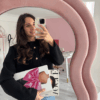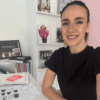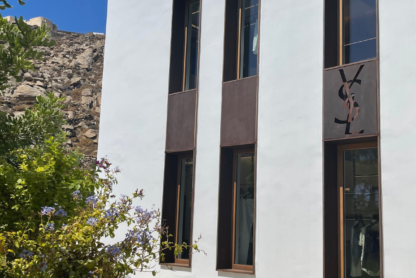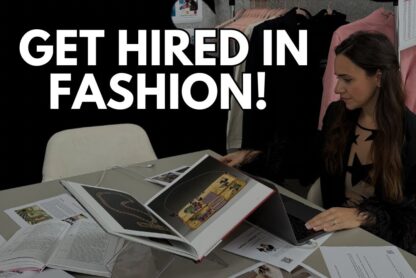If you’ve ever dreamed about working in fashion, chances are you’ve bumped into some myths about the industry that make it seem either impossibly glamorous or super exclusive—reserved for a handful of insiders. Well, I’m here to say that’s not the case!
With over 10 years in the fashion industry—from starting out in e-commerce at Alexander McQueen, Yoox-Net-A-Porter, and Kering to leading Glam Observer as a CEO and fashion educator since 2017—I’ve experienced the industry from every angle: the job search, internships, full-time roles, and now, guiding aspiring fashion professionals every day.
When I was first looking for my start in fashion, I believed in some of these myths, too. They seemed daunting, and they can hold you back from fully chasing your fashion dreams. Over the years, I’ve seen how many fashion enthusiasts’ challenges don’t just start with applications and interviews; they often begin before that—when myths and misconceptions keep them from even taking the first step.
Watch this video or keep reading the article.
Fashion Job Search Myths that might be preventing you from getting the role of your dreams
The journey to your dream job in fashion can already feel tough, especially if you’re dealing with rejections. But what if the toughest hurdle isn’t applying, but overcoming the fears and doubts that come from these industry myths?
Thoughts like “I’m not cut out for the big brands,” “My resume isn’t impressive enough,” or “I don’t have connections in fashion”—sound familiar? I’m here to tell you that these are just myths.
As a fashion career mentor, part of my mission at Glam Observer is to bust these myths. I want to give you a clear view of what to expect, along with the skills and confidence to reach your goals. Today, let’s debunk eight of the biggest myths about the fashion industry. Then, reveal what it’s really like to work in fashion.
Fashion Industry Myth #1: The Best Opportunities Are Only at Big Brands and Famous Magazines
Reality: Great Fashion Careers Exist Everywhere!
While working for big names like Chanel, Prada, or Vogue might seem like the ultimate goal, there are incredible opportunities across the entire fashion industry. From luxury e-commerce giants like Net-a-Porter and Farfetch to PR firms, trend forecasting agencies, and emerging brands, exciting roles exist in every corner of fashion. Smaller companies and startups often offer more creative freedom and faster career growth. So, don’t limit yourself—the best opportunities might be where you least expect them!
Just to list a few examples:
- Luxury and fashion retailers and E-commerce platforms: YOOX Net-a-Porter Group, MyTheresa, Farfetch, Luisa Via Roma, ASOS, Galleries Lafayette…
- PR Agencies: Karla Otto, KCD Worldwide, Negri Firman, Purple PR, Smith Petersen…
- Trend Forecasting Agencies: WGSN, FashionSnoops, Pantone…
- Digital Marketing and Social Media Agencies: Bold Management, Pilot Room…
- Talent Agencies: The Wall Group, SEE Management…
- Model Agencies: Elite Model Management, Ford Models, IMG Models
- Consider also fashion startups and emerging brands.
In my online course Break into the Fashion Industry, I share how to get a job at your dream fashion company even if you don’t have experience or a fashion degree.
Fashion Industry Myth #2: You need to be a Designer or Know How to Sew
Reality: The industry is made up of many roles (many of which don’t require a fashion technical expertise!)
When people think of fashion, they often picture designers sketching collections or seamstresses sewing dresses. While these roles are important, they’re just a small part of what the industry has to offer. From marketing and PR to e-commerce and trend forecasting, there’s a wide range of roles that don’t require a stitch of sewing or sketching experience. This is because fashion is also a business so there are thousands of people from different departments who take care of branding and selling the clothes, shoes, and accessories.
The Break Into the Fashion Industry course is designed to help you discover these lesser-known roles and show you how to position yourself for success in them.
Fashion Industry Myth 3: The number of jobs and internships posted online is very limited
Reality: Most of the positions are not advertised. There are plenty of job and internship opportunities for everyone. You just have to know where to look to find them.
When looking for fashion jobs and internships, the first thing candidates usually do is check the career pages of brands, magazines, luxury groups, and LinkedIn. And you are right. This is a traditional strategy that works for many and there are many opportunities advertised every week. But what most aspiring fashion professionals don’t know is that the job and internship offers you can find online are NOT the only ones fashion companies have.
That’s right – most vacancies are not advertised online but only internally inside the company or through word of mouth. But not only. Another strategy to find jobs and internships in fashion is emailing recruiters directly. This is my favorite unconventional strategy to break into fashion which is often overlooked. But it’s amazing because it allows you to access more job and internship opportunities, stand out from other candidates, and demonstrate that you think out of the box, which companies love!
Don’t wait for your favorite magazines or brands to post a job or internship online so you can apply, but take the initiative and send them a cold e-mail, asking for an opportunity and submitting your resume, cover letter, and portfolio.
My Break into the Fashion Industry course gives a step-by-step on how to email fashion companies directly – a strategy that proved effective for many of my students who now work at Vogue Business, Dior, and Co.
Fashion Industry Myth 4: My resume is short – no company will hire me
Reality: It’s okay to have a short resume at the beginning of your career
Many aspiring professionals feel intimidated by their short resume and think it drives recruiters away. Let me tell you that it’s not a problem. It’s absolutely okay to have a short resume when you are starting out; companies don’t expect you to have a long list of experiences and achievements at the beginning of your career.
What they pay attention to instead is how you structure your CV, whether it’s well-organized, the layout is clean, and if you mention the necessary skills and keywords from the job description. So it’s not the length of your resume that counts but the quality. Even at Glam Observer, I often see applicants submit resumes that are too long, static, or generic. It misses the mark in customization for the role or company. Even if you have no prior experience, you can still make your resume compelling by presenting it thoughtfully and tailoring it to the role.
Fashion Industry Myth 5: You Only Need a Portfolio for Creative Roles, and Only if It’s Requested—Plus, You Can’t Make One Without Experience
Reality: A Portfolio Can Be a Game-Changer for Any Role and Is Valuable Even Without Prior Experience!
It’s a common misconception that portfolios are just for designers, stylists, or other creative roles and that you only need one if the job description specifically asks for it. In reality, a portfolio can be incredibly valuable for a range of roles, including PR, marketing, buying, and merchandising. Having a portfolio shows potential employers a tangible example of your skills. Also, it can make your application stand out, even if you’re applying for roles outside traditional creative fields.
And don’t worry if you’re just starting out! You can build a portfolio with personal projects, mock-ups, case studies, or school assignments. For example, if you’re interested in PR, you could create a sample press release or event plan. If buying is your goal, you could create a mood board with product selections and trends. The key is to show your initiative, skills, and passion for fashion. Even without official experience, a portfolio demonstrates your understanding of the role and your drive. It can make all the difference in getting noticed.
Don’t have a clue how to build a portfolio? My Summer Fashion Camp 2025 has you covered. This internship-style course from home will include real projects, industry mentors, and a portfolio that stands out. Sign up here for the waitlist for early bird bonuses.
Fashion Industry Myth 6: You can’t get a job in fashion unless you know someone
Reality: You can break into the industry with no connections
This is one of the most widespread myths in the fashion industry. While networking is important and yes, there are many job opportunities advertised through word of mouth, knowing someone (who knows someone) is not a prerequisite to landing a job or internship in fashion. It’s your skills and strategies that matter like the cold e-mail one that I shared above.
That being said, leveraging and cultivating your connections is important for networking. It also helps accessing more job opportunities and getting noticed among recruiters. LinkedIn is the n#1 professional network in fashion where you can find recruiters, fashion jobs, join fashion groups, and more.
Fashion Industry Myth 7: Working in Fashion Means Always Attending Glamorous Events
Reality: Most fashion professionals work behind the scenes
From fashion shows to exclusive brand launches, the industry’s image is often one of nonstop glitz and glam. Events are an exciting perk, but they’re a small part of a much larger, complex industry. While some fashion editors, buyers, and PRs get invited to fashion shows (but consider they are there for work, not just for fun,) most professionals’ workdays consist of planning, managing deadlines, tracking data, and working on Excel sheets. So not attending runway shows.
Most fashion professionals use Excel on a daily basis, so it’s one of the most requested to work in fashion. I teach it inside my Excel for Fashion course.
Fashion Industry Myth 8: Breaking into Fashion is Impossible Without Years of Experience
Reality: You don’t need experience to start in the industry
Many believe they need extensive experience to even apply for fashion jobs. While experience is valuable, the industry also values enthusiasm, adaptability, and skills. Entry-level roles and internships are designed to help you get your foot in the door and learn as you go.
My Summer Fashion Camp 2025, an online internship-style course will provide you the experience you need to get started (no previous experience or fashion degree needed). You’ll work on real fashion projects in fashion styling, marketing, editorial, trends, etc. that will build you a portfolio you need to stand out in your job applications.
Doors will open June 16th. Sign up here for the waitlist not to miss the start date and enjoy early-bird bonuses!







